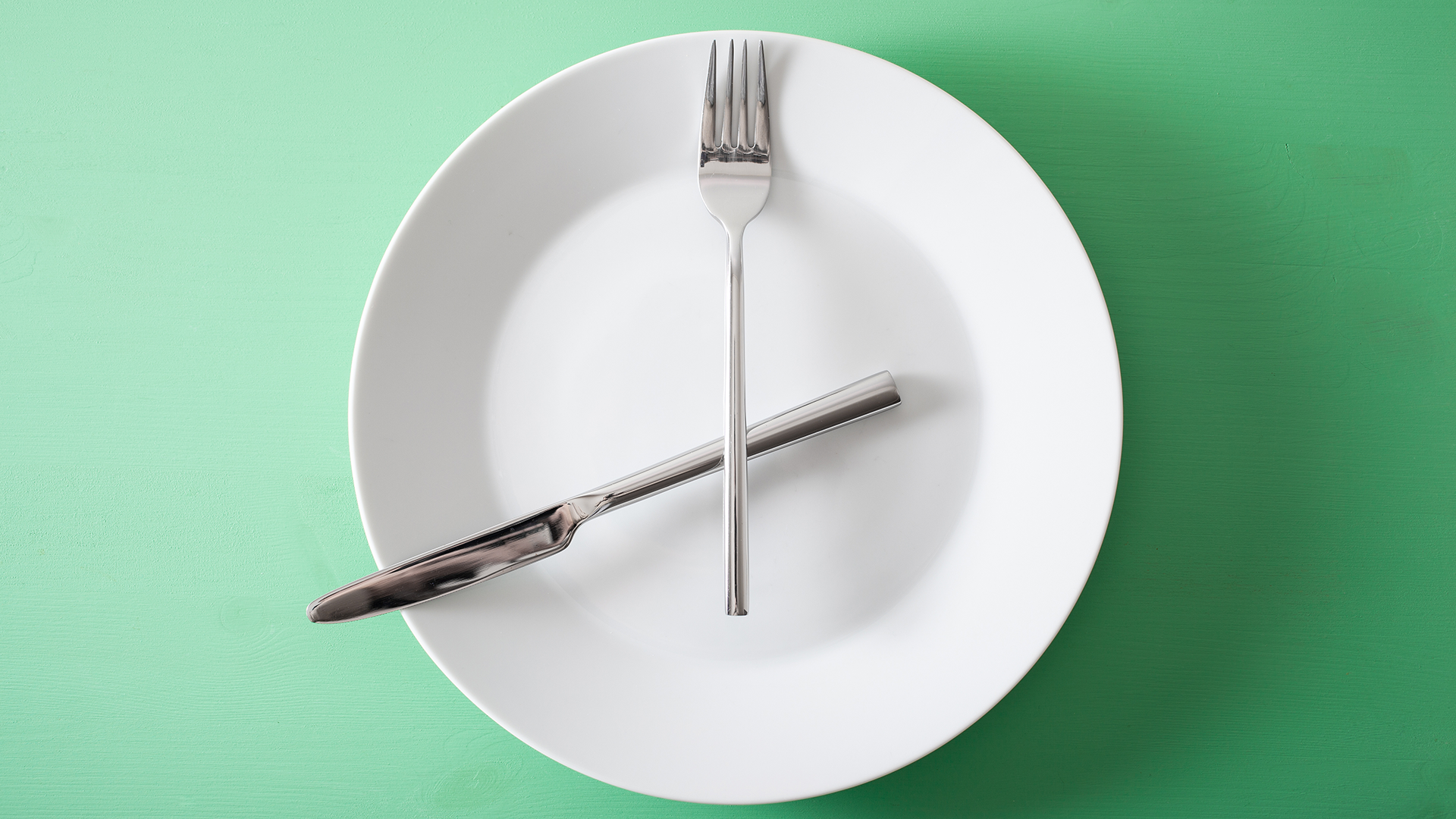Fed up with your latest fad diet? Well, the good news is there’s another one on the way.
Yes, just when you thought that intermittent fasting couldn’t get any harder, we now have the 36-hour fasting method—also known as the Monk Fast.
It’s being screamed from the rooftops by many as the answer to the dieter's prayers as a means to lose weight quickly.
So if you’re about to go on holiday or trying to fit into that new dress a bit more comfortably, could this be the answer?
Let’s take a closer look.
Is the 36-hour fasting method worth it?
The 36-hour method involves abstaining from food for a day and a half and takes some willpower. But it’s been given exposure through celebrities who claim to have tried it.
The likes of Kourtney Kardashian, Scarlett Johansson, Jennifer Aniston—and even former UK prime minister Rishi Sunak—have admitted that they’ve tried it.
The key word here is “tried.” There is no proof of success, and that's the worrying thing. Taking on an unproven method of dieting is dangerous to your health.
It doesn’t sound much fun, either. Not being able to give your body the nutrition it needs over a long period means that cravings are likely to creep in and derail the process altogether. And as you know, cravings tend not to be of the healthy kind.
Intermittent fasting tends to be popular among those looking to lose weight. But a 36-hour period is challenging and it’s only for those who have the mental toughness to stick it out.
But perhaps the question we should ask first is, “Does it actually work?”
Some people claim that it works for them. That said, the evidence is limited, and the scientific fact is that it’s no substitute for a healthy, balanced lifestyle.
So what’s it all really about? Let’s find out.
Read: Tips For Eating Out And Staying Healthy
How does 36-hour fasting work?
Like any form of intermittent fasting, it takes a lot of willpower to pull it off successfully, but there are three parts to the Monk fast.
The duration
The length of this fast is 36 hours which is typically much longer than most types of fast. It’s a complete abstinence of all food for a day and a half.
The easiest (or less difficult) way to do this is to incorporate sleep into that window. For example, you can have a main meal in the evening, then eat nothing until breakfast 36 hours later. This means it might only feel like you’re fasting for one day, but it’s still a tough ask.

What you are allowed to consume
It’s not all doom and gloom, of course. Your body will need some sustenance to keep functioning, and there are some low-calorie allowances. These include black coffee, tea, water and other zero-calorie drinks.
The metabolic shift
Here comes the weight loss bit. After 12 hours, your body will enter ketosis. This is when it starts using fat for energy instead of carbs.
What are the main 36-hour fasting benefits?
While there’s nothing conclusive as far as studies go, there are some potential benefits from fasting for 36 hours.
Weight loss
Probably the number one reason to perform an extensive fast is weight loss. The ketosis effect can help to burn your stored fat by using it for energy. It’s an extreme way to do a calorie burn, compared to regular exercise, for instance. But it can help to shift weight over a short period of time.
Improved insulin sensitivity and blood sugar control
A 36-hour fast can have an impact on blood sugar levels, and it’s not recommended for those who are diabetic.
It can improve insulin sensitivity and decrease insulin levels, which can lead to improved blood sugar control, but it’s best to check with a healthcare professional if you have any medical conditions that may cause issues.
Possible enhancements in heart health and blood pressure.
A recent study showed that intermittent fasting led to a decrease in blood pressure and improved hypertension.
More studies are needed, but fasting seems to be well tolerated by the individuals, and the results were encouraging.
Potential cognitive benefits
There are thought to be potential benefits for cognitive function from fasting, potentially through the willpower needed to get through prolonged fasting.
Anti-aging effects
It’s far from conclusive, but during fasting, there’s a triggering of autophagy, a cellular "cleaning" process that may have anti-aging effects.

What are the risks of 36-hour fasting?
This type of fasting can be challenging and may not be suitable for everyone, especially if you have underlying health conditions. The most common issues caused by this kind of diet are…
Dizziness
A lack of solid nutrition for 36 hours can cause lightheadedness or dizziness as your body reacts to the shock of searching for an energy source in a different area.
Fatigue
Without the usually healthy nutrition your body needs, fatigue is likely to set in, particularly during the later stages of the fast. It’s important to be aware of this, particularly if you’re going about your usual daily chores.
Reduced focus
This can happen regularly, especially for those new to fasting. You’ll be very aware of the fact that you’re hungry and this can cause you to lose focus on things that you can normally deal with easily.
Issues for those with underlying health conditions
If you have certain health conditions, it’s important to be aware that fasting in this way might not be for you. For example, if you have a history of disordered eating, you’re pregnant, or you’re diabetic— you should avoid this type of fast
If you’re considering a 36-hour fast you should consult with a healthcare provider first, especially if you have any underlying health conditions.
How to lose weight the healthy way
To lose weight healthily, focus on making sustainable lifestyle changes rather than drastic short-term measures that can lead to health issues and piling the pounds back on.
Here are some key strategies to help you lose weight sensibly.
Eat a healthy, balanced diet
Your main aim should be to give your body the nutrition it desperately needs to function without eating excess calories. You should prioritise…
- Fruits
- Vegetables
- Whole grains
- Healthy fats
- Lean proteins
- Low-fat dairy products
You should also limit foods that are high in added sugars, processed foods, and unhealthy fats.
Set realistic goals
Your body needs to adapt if you’re making changes to your dietary routine, so don’t aim too high initially.
Losing just one or two pounds a week adds up considerably over time and is a much more sustainable way to lose weight than trying a “quick fix”.
Exercise daily
Find activities you enjoy to make exercise sustainable, and try to gradually increase the intensity. Physical activity is essential if you want to manage your weight.
Read: Low-Intensity Workout Tips
Keep hydrated
It’s important to drink water regularly if you want to keep on track, especially if you’re exercising more regularly. Hydration not only helps to keep your body functioning properly, the water consumption can also help to suppress your appetite.
Read: Does Drinking Water Help You Lose Weight

Plan your meals carefully
It’s all too easy to grab on-the-go food when you’re trying to juggle a buddy lifestyle, so meal preparation is a must.
Prepare healthy meals in advance to avoid impulsive eating and ensure balanced nutrition.
Get plenty of sleep
A poor quality of sleep can seriously affect your weight loss efforts, so try to aim for seven to nine hours of quality sleep per night.
Be patient
Don’t try to do too much too soon. If you have a target date in mind for your weight loss, try to start your weight loss routine as far in advance.
Losing one or two pounds a week is considered safe, and sustainable, and it will be much easier to keep the weight off once you’ve hit your target.
Take a supplement
A natural healthy supplement that acts as a suppressant can help to stem hunger cravings and make the whole weight loss journey run much more smoothly.
Making changes to your lifestyle is better for better your overall health and sustainable weight management.
Read: How To Get The Most From Your Weight Loss Supplements

What are the pros of 36 hour fasting?
The main health benefits of a 36 hour fast are…
- A short-term weight loss and reduced body fat
- Possible insulin resistance
- Potential short-term blood pressure and cognitive benefits
What are the cons of 36 hour intermittent fasting?
A fasting period of 36 hours means you'll experience nutritional deficiencies. As with any other form of periodic fasting, it comes with risks. So, it’s not suitable for…
- Those with eating disorders
- Pregnant women
- People with underlying health conditions
What is the best way to lose weight?
Losing weight in a healthy, sustainable way is a far better choice. Not only for your health but also to avoid rapid weight gain once the plan has finished.

Taking control of your weight management can have significant health benefits, like…
- Improved metabolic health
- Reduced risk of chronic diseases
- A better digestive system
- Mental clarity
- Better cellular function
- Reduced risk of cardiovascular disease
- Reduces cholesterol levels
Take back control of your weight and overall health by choosing sustainable weight loss. You’ve got this.
How PhenQ can help
Choosing a quality, natural supplement can give you huge support through your weight loss journey, making the process a whole lot easier.
PhenQ is a powerful new slimming formula combining multiple weight loss benefits. It can help to…
- Burn stored fat
- Suppress your appetite to eat less and cut calories
- Block fat production to stop weight gain
- Improve your mood and energy levels for hassle-free weight loss
Let PhenQ help you to make sustainable weight loss less challenging and get you to your weight loss goals.
Fasting FAQs
How should you prepare for a 36-hour fast?
Before you start fasting, always check with a medical professional to see that it’s safe to do so.
Everyone is different, and it’s not a “one-size-fits-all” diet. Start your diet slowly, gradually increasing the duration if you find it easier until your body starts to adapt.
Is the 36 hour fasting diet worth the risks involved?
It’s your own personal choice. If you feel the risks are worth taking, you may feel you want to try the diet. In our opinion, a sustainable, healthy diet plan based on healthy nutrition and regular exercise is best.



